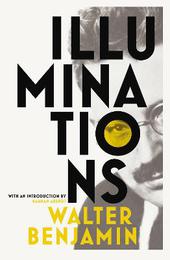
|
Illuminations
Paperback / softback
Main Details
| Title |
Illuminations
|
| Authors and Contributors |
By (author) Walter Benjamin
|
| Physical Properties |
| Format:Paperback / softback | | Pages:272 | | Dimensions(mm): Height 216,Width 135 |
|
| Category/Genre | Literary studies - general |
|---|
| ISBN/Barcode |
9781847923868
|
| Classifications | Dewey:809 |
|---|
| Audience | |
|---|
|
Publishing Details |
| Publisher |
Vintage Publishing
|
| Imprint |
The Bodley Head Ltd
|
| Publication Date |
5 November 2015 |
| Publication Country |
United Kingdom
|
Description
A legendary collection of essays by one of the most influential thinkers of the 20th century Illuminations contains the most celebrated work of Walter Benjamin, one of the most original and influential thinkers of the 20th Century- 'The Work of Art in the Age of Mechanical Reproduction', 'The Task of the Translator' and 'Theses on the Philosophy of History', as well as essays on Kafka, storytelling, Baudelaire, Brecht's epic theatre, Proust and an anatomy of his own obsession, book collecting. This now legendary volume offers the best possible access to Benjamin's singular and significant achievement, while Hannah Arendt's introduction reveals how his life and work are a prism to his times.
Author Biography
Walter Benjamin (1892-1940) was a philosopher, translator and critic. Born in Berlin into a prosperous Jewish family, he made a precarious living as a literary journalist, championing the drama of Bertolt Brecht and translating the work of Baudelaire and Proust. He is most famous for his essays 'The Task of the Translator' (1923) and 'The Work of Art in the Age of Mechanical Reproduction' (1936). With the rise of the Nazis in 1933, he emigrated for Paris, and in 1940 he fled for the Spanish border, where he committed suicide.
ReviewsFrom the evidence of this book I would suggest that Benjamin was one of the great European writers of this century * Observer * He explained the modern with an authority that fifty years of unpredictable change have not vitiated * New York Review of Books * Like Baudelaire, Benjamin brings the very new into shocking conjunction with the very old ... He is in search of a surrealist history and politics, one which clings tenaciously to the fragment, the miniature, the stray citation, but which impacts these fragments one upon the other to politically explosive effect, like the Messiah who will transfigure the world completely by making minor adjustments to it
|